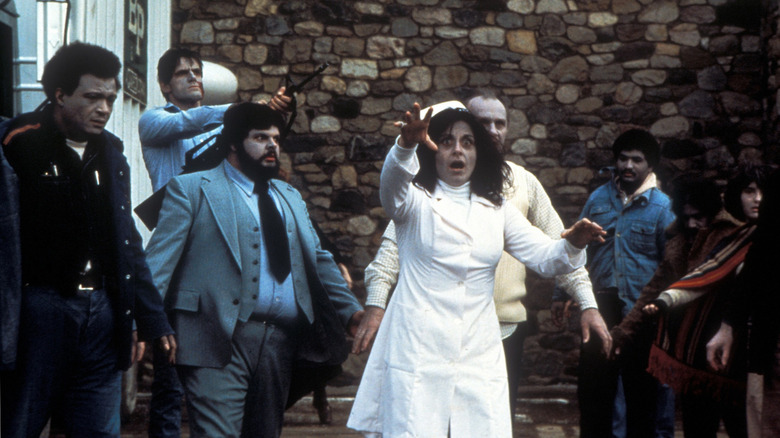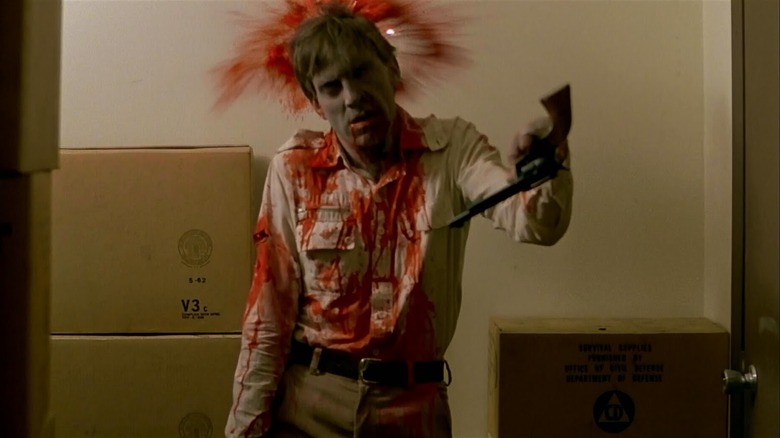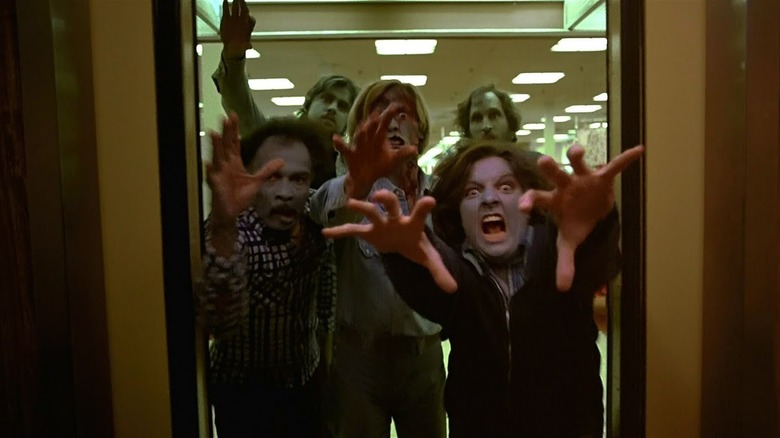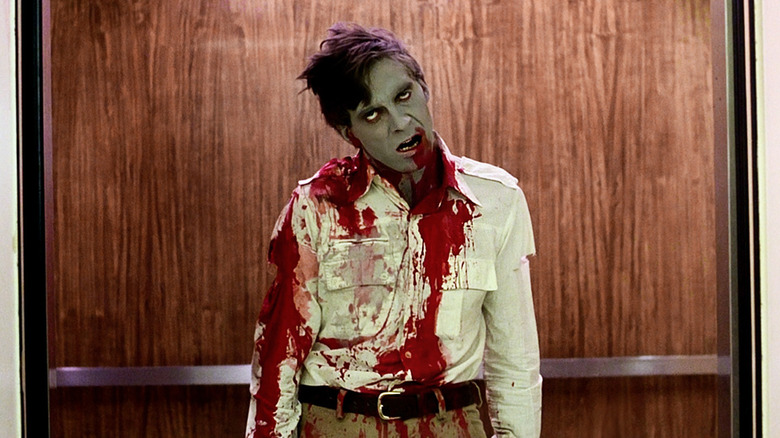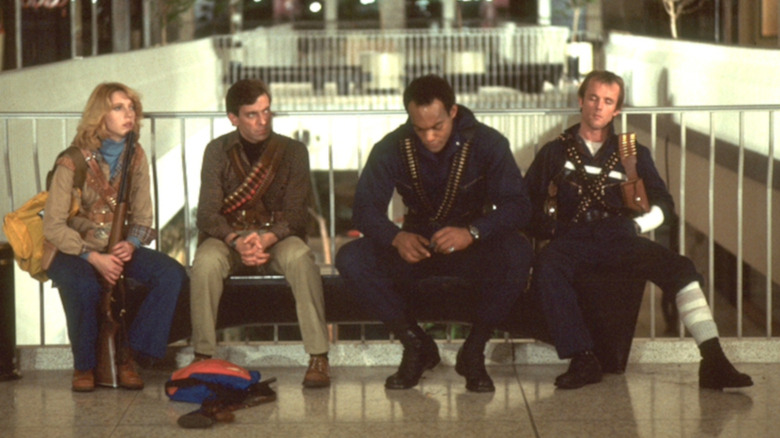George Romero Understands Why Someone Would Walk Out On One Of His Films
It is important to remember that film is an art form, therefore it is subjective. Your opinion will be different from mine, and there is no "right or wrong." However, genres and narrative structures often shape the expectations of our favorite movies. So when filmmakers operate outside of the established rules, they know that they're taking a risk.
When George Romero debuted his 1978 zombie film "Dawn of the Dead" he understood that it might not be for everyone. He was fine even if audiences walked out of one of his movies.
Romero began his journey of becoming the "father of the zombie movie" in 1968 with his directorial debut "Night of the Living Dead." The movie created a new genre and critics often considered the film an allegory for race relations during the era. A decade later, Romero released the sequel "Dawn of the Dead." Set in a shopping mall, audiences didn't have to look far to find the modern critique of consumer culture taking shape in the late 1970s. It was on point, heading into the 1980s decade of decadence.
But when it made its theatrical debut in the U.S., "Dawn of the Dead" was met by a mixed reaction from audiences. In the eyes of George Romero, that was actually a good thing.
'What kind of sick mind could make a film like this?'
While the meaning behind "Night of the Living Dead" might be implicit, the social messages in "Dawn of the Dead" are obvious and heavy-handed. The film opens in a chaotic Philadelphia TV news studio (WGON, get it?), the nerve center of public information, as zombies take over the country. Meanwhile, during a mandatory evacuation, a S.W.A.T team is removing people from their apartment buildings downtown. The opening sequences reveal a confusing, desperate, and gruesome backdrop for the film. Four survivors eventually find refuge in a shopping mall, where they attempt to ride out the apocalypse.
"Dawn of the Dead" was first screened at Dallas' U.S.A. Film Festival in April of 1979. Within the first 15 minutes of the movie, The New York Times columnist Janet Maslin, along with dozens of others, walked out on the film. She later cited a zombie "pet peeve" in her film review and a disdain for the film's violence. I stop short of calling the violence gratuitous, because what else would one expect from a zombie apocalypse?
Roger Ebert, who selected the film for inclusion in the festival, called "Dawn of the Dead" the most controversial movie at the festival. Ebert observed, "After one screening, a shouting match developed between audience members who asked, 'What kind of sick mind could make a film like this?' and others who called it the best film in the festival."
Romero understood the criticisms and remained steadfast in defense of his movie. He told Ebert:
"If nobody walked out, it wouldn't be the movie I wanted to make. [...] The point is that people come out of the film having experienced some very extreme emotions, and it's up to them to interpret what happened."
Zombie movies as social problem films
With "Dawn of the Dead," Romero shows how a zombie movie can be a social problem film as much as a horror subgenre. Perhaps the most disturbing part of the film's opening sequences is how quickly we turn on each other in times of crisis.
In Maslin's review (in which she admits to having most of the movie explained to her in the lobby afterward), she noted, "It was also graphically demonstrated that the only way to kill one of these zombies permanently was to blow his or her head off, preferably in a nice, tight close-up."
It's a lesson to not judge a book by its cover, or a film by the number of zombie bites in the first 15 minutes. Had Maslin stuck around, she would have discovered that the film is not about zombie attacks but rather how society might respond to a zombie apocalypse.
The opening sequence in the WGON TV studio eerily plays out like the often uninformed or politicized arguments over COVID-19 that recently occurred on social media and 24-hour news networks. In the movie, a production assistant watches civility break down in the studio and observes, "We're blowing it ourselves." This was all before a zombie appeared onscreen. Romero's entire point was lost on Maslin that we are the enemy.
The real horror is people
"Dawn of the Dead" is often considered one of the greatest zombie films of all time (subjectively, of course). When Maslin and others walked out of the movie, they missed scenes featuring zombies wandering the shopping mall aimlessly, sardonically to the tunes of Muzak. "Why do they come here?" a survivor asks, to which she's answered, "Some kind of instinct, a memory of what they used to do. This was an important place in their lives."
Romero masterfully juxtaposed one of society's worst possible disasters imaginable with absurdity and dry humor. After all, who can resist the joys of a mall shopping spree, even if it's for supplies for the end of the world? The music (produced by Italian horror master Dario Argento) adds tremendously to the film's fleshy irony.
Romero also underlined the real horror of the film as people. It's no wonder that "Dawn of the Dead" wasn't for everyone. Romero unabashedly took aim at what he perceived as society's biggest weaknesses of the era: consumerism and greed. The survivors in the movie plant their flag in the mall by exclaiming, "We took it, and it's ours." After all, they were surviving the zombies just fine, and then other people came along and spoiled it. One can easily argue that Romero was on to something. It was all too similar to the me-first attitude that played out during the pandemic. Who can forget how well we handled the simple request of social distancing?
#USA keeps surprising you.
There is an anti-social-distancing protest at the statehouse in Columbus, Ohio. They are asking local authorities to cancel #StayAtHomeSaveLives measures. 🙏 #CoronavirusOutbreak pic.twitter.com/Lzs8NEJsFA— Kumar Manish (@kumarmanish9) April 19, 2020
Maslin eventually came around
Janet Maslin eventually came around, somewhat. In her review of Romero's later work, she described his 1978 classic "as ingenious as it was stomach-turning." And in 2020, Maslin apologized on social media for walking out of the "Dawn of the Dead" premiere. The George A. Romero Foundation thanked Maslin and asked her to reconsider watching the film, to which Maslin accepted.
